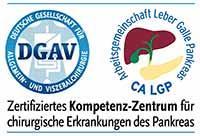Gastrointestinal Carcinoid Tumors — CRS and HIPEC - Hyperthermic Intraperitoneal Chemoperfusion: treatment in the Best Hospitals of Germany
Treatment prices are regulated by national law of the corresponding countries, but can also include additional hospital coefficients. In order to receive the individual cost calculation, please send us the request and medical records.

Department of General, Abdominal, Transplant, Hepatopancreatobiliary, Colorectal, Endocrine, Bariatric Surgery and Hernia Surgery
The Department of General, Abdominal, Transplant, Hepatopancreatobiliary, Colorectal, Endocrine, Bariatric Surgery and Hernia Surgery provides the full range of services in the areas of its specialization and holds a leading position at the national and international levels in terms of the number of surgical interventions performed and their success. Of particular interest are operations for treating diseases of the bowel, stomach, esophagus, pancreas, liver, gallbladder, and bile ducts, and endocrine glands. The department's doctors have excellent skills in the surgical treatment of cancer, surgery for liver, kidney, pancreas, and small intestine transplants, and operations for morbid obesity. The department's operating rooms are the pride of the medical facility, since they have all the necessary technical options for performing operations with the da Vinci surgical system, image-guided interventions, and endoscopic surgical procedures, which are characterized by minimal trauma rates.







Department of General and Abdominal Surgery, Hepatopancreatobiliary Surgery, Colorectal Surgery, Endocrine Surgery, Hernia Surgery and Bariatric Surgery
The Department of General and Abdominal Surgery, Hepatopancreatobiliary Surgery, Colorectal Surgery, Endocrine Surgery, Hernia Surgery and Bariatric Surgery offers the full range of effective surgical treatments in accordance with modern medical standards. Operations of varying complexity are performed on the stomach, colon, pancreas, liver, gallbladder, bile ducts, rectum, thyroid gland, and parathyroid glands in the department's operating rooms every day. The department's primary focus is the surgical treatment of malignant gastrointestinal tumors. The medical facility is certified in this area by the German Cancer Society (DKG). The team of endocrine surgeons specializes in the treatment of diseases of the thyroid gland, parathyroid glands, and adrenal glands. Patients with morbid obesity are also successfully operated on here. In their work, the department’s specialists primarily use minimally invasive surgical techniques, which virtually eliminate trauma to healthy tissue during the intervention. The department's operating suite is equipped with an innovative da Vinci Surgical System, which allows the doctors to perform sparing and high-precision surgical interventions. The specialists of the medical facility strictly adhere to hygiene and safety standards and create the most comfortable conditions for each patient during their hospital stays.







Department of General and Abdominal Surgery
According to the Focus magazine, the Department of General and Abdominal Surgery ranks among the top German departments specializing in bowel cancer treatment! The department offers the full range of classical and minimally invasive methods for the treatment of common surgical diseases, cancer pathologies, diseases of the endocrine organs, proctological problems. The specialization also covers transplant surgery (liver, kidney and pancreas transplantation). The department is certified by the German Cancer Society for its outstanding results in the treatment of bowel, pancreatic, stomach and liver cancers.






Cancer is successfully treated in the world's best hospitals, even in the advanced stages, and small intestine cancer is no exception. Even if it has spread to the peritoneum, specialists in German hospitals know how to solve this problem. You are welcome to use our service if you want to find out the prices for medical procedures in Germany and make an appointment for your treatment. We will select the most suitable hospital for you and take care of all the arrangements for your trip.
Content
- When can CRS/HIPEC be used for small intestine cancer?
- How is CRS/HIPEC performed for small intestine cancer?
- Treatment results for small intestine cancer
- Where can I undergo small intestine cancer treatment?
When can CRS/HIPEC be used for small intestine cancer?
Small intestine cancer is a rare but prognostically unfavorable disease. These tumors account for 5% of all gastrointestinal malignancies.
One of the main causes of tumor recurrence after primary treatment is peritoneal carcinomatosis, in which tumors spread within the abdominal cavity.
Metastases of small intestine cancer to the peritoneum are found in every third patient at the advanced stage of the disease. In standard cases, doctors treat these patients with systemic chemotherapy and palliative procedures. With this approach, median survival rates range from 8 to 20 months.
Significantly better results can be achieved when using cytoreductive surgery (CRS) with subsequent hyperthermic intraperitoneal chemotherapy (HIPEC). This treatment method is successfully used in advanced German hospitals. Ideal candidates for CRS/HIPEC are patients with normal general health conditions who can tolerate complex surgery. These patients also have a carcinomatosis index of less than 15, have no distant metastases in their internal organs outside the abdominal cavity, and have highly or moderately differentiated tumors of the small intestine. For non-ideal candidates, the procedure can also be performed, but treatment outcomes may be worse.
How is CRS/HIPEC performed for small intestine cancer?
Treatment begins with surgery. Cytoreductive surgery, unlike radical surgery, does not aim to completely cure the cancer. The goal is to shrink the tumor size as much as possible.
When performing surgery, doctors remove the affected part of the small intestine and suture its ends together to restore the continuity of the digestive tract. Surgeons also strive to remove any tumor foci that can be seen with the naked eye. Unlike radical procedures, tissues are not removed with a margin. Visually unchanged organs are entirely preserved.
Treatment results depend on whether the surgeon has managed to perform a complete cytoreduction, that is, the removal of all tumor foci. Cancer Centers with vast experience achieve this result in 90% of cases.
Hyperthermic intraperitoneal chemotherapy is performed at the final stage of the operation. The HIPEC procedure involves rinsing the abdominal cavity with a heated solution of cytostatics, and it lasts 1 hour. Doctors place drainage tubes in the abdominal cavity to perform this procedure. One set of drainage tubes is used to administer the solution into the abdominal cavity, while the other set allows it to drain out.
Hyperthermic intraperitoneal chemotherapy is much more effective than systemic chemotherapy due to the following two factors:
- The higher concentration of cytostatics. It is 10-20 times higher than the concentration achieved in the blood during systemic chemotherapy.
- Heating the solution. High temperatures (usually up to 43 degrees Celsius) allow cytostatics to have a stronger effect on cancer cells and penetrate deeper into the tissues.
A good CRS/HIPEC result is therefore achieved due to the maximum reduction of all tumors. They are completely removed, and the remaining small clusters of cancer cells are destroyed with the subsequent intraperitoneal chemotherapy.
Treatment results for small intestine cancer
The effectiveness of CRS/HIPEC is clinically proven. Treatment outcomes are superior to any other treatment, including systemic (intravenous) chemotherapy.
In a Japanese study published in 2015, the authors described the experience of one medical center specializing in CRS and hyperthermic intraperitoneal chemotherapy in 31 patients with small intestine adenocarcinoma. The authors concluded that this was the optimal treatment strategy for peritoneal carcinomatosis. The median survival rate was 3 years. The Japanese researchers managed to obtain the best results in patients with complete cytoreduction, with a peritoneal carcinomatosis index of less than 15. The group that underwent HIPEC had better survival rates compared to cytoreductive surgery alone.
In 2018, data from a multi-institutional registry (Amsterdam, the Netherlands), including 152 patients from 21 Cancer Centers, was published. They were treated between 1989 and 2016. The average PCI (peritoneal cancer index) was 10, but varied widely, ranging from 1 to 33. Doctors managed to achieve complete cytoreduction in 88% of patients. The median survival rate was 31 months. The one-year survival rate was 83%, the three-year survival rate was 46%, and the five-year survival rate was 31%. The study showed that patients after complete cytoreduction, without metastasis of the primary bowel tumor in distant lymph nodes, with a PCI less than 15, and with less aggressive histologic types of small intestine tumors, can expect a long-term remission.
A review of 12 studies published in 2022 showed a five-year survival rate after CRS/HIPEC ranging from 25% to 40%, which is excellent, taking into account the advanced stage of the disease.
Where can I undergo small intestine cancer treatment?
You can undergo your treatment in Germany. CRS/HIPEC has been successfully used in German hospitals for colon cancer treatment for decades.
You can find out the cost of treatment in Germany on the Booking Health website. On our website, you can also find direct prices offered by hospitals. The Booking Health specialists will help you select the most suitable German Cancer Center taking into account the cost of treatment and the quality of medical services.
If you make an appointment for your colon cancer treatment through the Booking Health service, the price for you will be lower than if you seek medical help directly from the hospital. The reduced treatment costs are achieved due to the absence of additional fees for foreign patients.
The Booking Health specialists will help you arrange your trip to Germany. We will contact the administration of the hospital, make an appointment for your preferred dates, book a hotel room, purchase airline tickets, and organize transfers from the hospital to the airport and back.
Authors:
The article was edited by medical experts, board-certified doctors Dr. Vadim Zhiliuk and Dr. Nadezhda Ivanisova. For the treatment of the conditions referred to in the article, you must consult a doctor; the information in the article is not intended for self-medication!
Sources:

